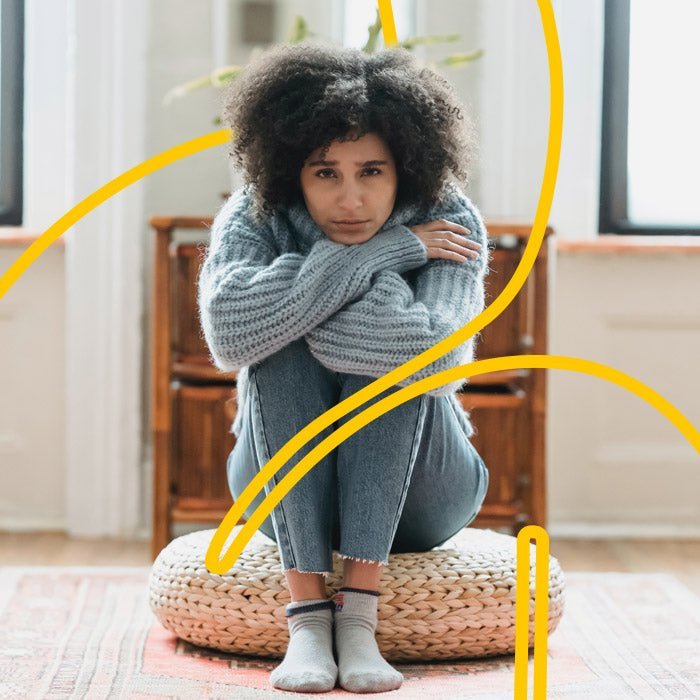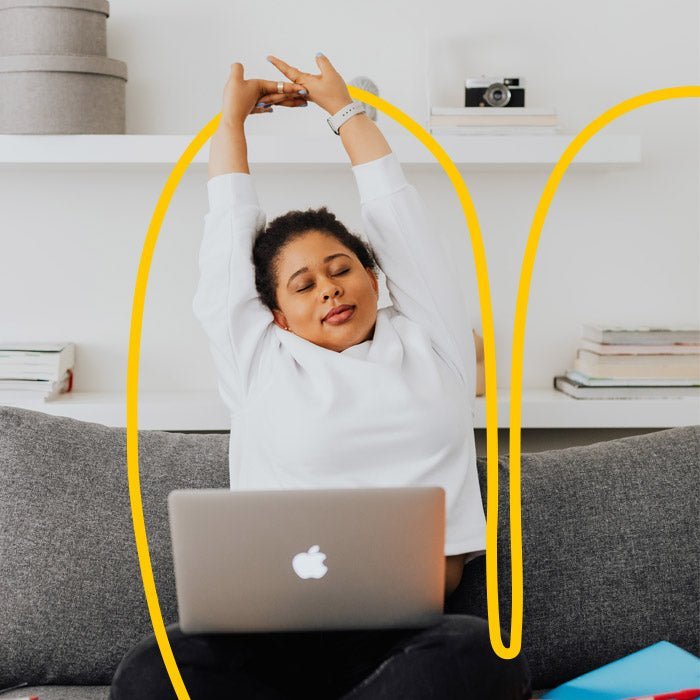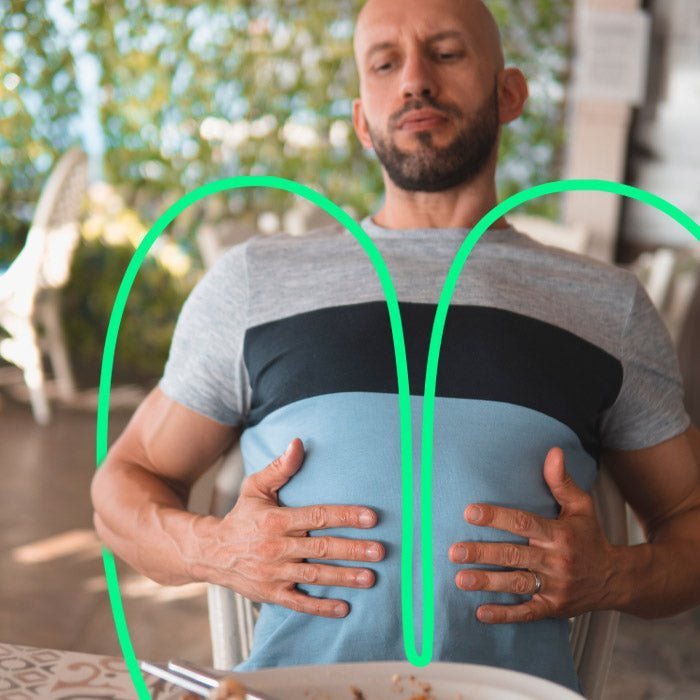
Medically reviewed by Kate Hilton RD
On 26 June 2023
What causes anxiety after eating?
Experiencing anxiety after eating can be caused by a number of foods, drinks, underlying conditions and even psychological factors. While the exact reasons may vary from person to person, some of the most common causes include:
Reactive Hypoglycaemia
Fluctuations in blood sugar levels can contribute to anxiety symptoms after eating. Rapid changes in glucose levels, such as a spike followed by a drop, can trigger anxiety in susceptible individuals. Reactive hypoglycaemia is typically triggered by processed carbohydrates, however the consumption of caffeine particularly on an empty stomach has also been shown to trigger symptoms by increasing adrenaline production.
Gastrointestinal Disorders
Research has found that irritation or distress in the gastrointestinal system can result in signals being sent to the central nervous system which are received by the brain, thus causing mood changes and potentially contributing to anxiety and even depression.
Food Sensitivities or Allergies
Certain foods can cause sensitivities or allergic reactions, leading to physical discomfort in the gastrointestinal system causing anxiety symptoms. Understanding your specific food triggers can help manage anxiety after eating by removing problem foods from your diet.
Psychological Factors
Psychological factors like stress, depression, fear, or past negative experiences with certain food can contribute to mood changes after eating. Emotional or psychological mood changes after eating can manifest as anxiety symptoms.
What are the symptoms of anxiety after eating?
Anxiety symptoms in individuals can hugely vary, however some of the most common symptoms experienced with anxiety include:
Restlessness or feeling on edge: A sense of unease or restlessness that manifests after eating. This could also be described as nervousness or “butterflies” and is typically the most noticeable symptom when it comes to anxiety.
Rapid Heartbeat: Increased heart rate or palpitations is a common symptom of anxiety.
Digestive Discomfort: Gastrointestinal symptoms such as indigestion, bloating, stomach pain, or nausea.
Changes in Breathing: You may experience shallow or faster breathing with anxiety. In more extreme cases, you may struggle to catch your breath.
Sweating: Excessive sweating, particularly on the palms or forehead.
Cognitive Symptoms: Racing thoughts, difficulty concentrating, or intrusive thoughts related to anxiety.
Emotional Distress: Feelings of fear, worry, distress, or a sense of impending doom.
Nausea and vomiting: Episodes of feeling nauseous and vomiting are common with anxiety. However there may be other reasons why you are feeling nauseous after eating, our helpful medical guide explores the causes of nausea, warning signs and what you can do to relieve symptoms.
What foods can trigger anxiety?
Some individuals may be much more tolerant to known anxiety inducing foods than others, whilst others may experience heightened symptoms when consuming foods that can trigger anxiety. Whilst there is not “one size fits all” when it comes to foods that trigger anxiety, some of the most common reported foods that can start symptoms include:
- Caffeine: High amounts of caffeine found in coffee, tea, energy drinks, and some sodas can simulate some of the symptoms associated with anxiety such as a rapid heart rate. Symptoms can appear to be much worse when caffeine is consumed on an empty stomach. Caffeine can also affect the body’s natural sleep cycle, which can also contribute to anxiety.
- Alcohol: Alcohol can cause anxiety especially during withdrawal or when consumed excessively, symptoms may appear worse the morning after which is commonly referred to as a hangover. During a hangover you are likely to experience more physical symptoms of anxiety such as an increased heart rate and trembling. Alcohol can affect the quality of sleep which can contribute to symptoms of anxiety.
- Highly Processed Foods: Food’s high in refined sugars, artificial sweeteners, additives, and saturated fats may lead to blood sugar imbalances and trigger anxiety symptoms.
- Food Intolerance or Allergies: Certain individuals may have specific food sensitivities or allergies that contribute to anxiety. Common food intolerances that can trigger symptoms include gluten, dairy, and food additives.
It is important to keep a food diary to try and identify patterns in your anxiety after eating. A personalised approach should be taken when trying to identify your trigger foods, although the above foods listed are known to trigger anxiety symptoms, it does not necessarily mean that they are the cause of your triggers.
For a more personalised approach, our food intolerance blood test will analyse how your body reacts to over 209 different types of foods.
Our medical guide "what is a food intolerance?" covers everything you need to know about food intolerance.
Are there any foods that can help anxiety?
While no single food can magically eliminate anxiety, incorporating a balanced diet that includes the following can support overall mental well-being and reduce the symptoms of anxiety:
- Start your day off with a glass of water. Our body’s crave water when we first wake up, even the slightest sign of dehydration can alter our mood.
- Try and introduce a form of protein into your breakfast. A source of protein at breakfast can help you feel fuller for longer throughout the day. It can also act as an energy boost first thing in the morning.
- Complex Carbohydrates: Foods like whole grains, legumes, oats, and vegetables provide a slow a steady release of glucose. This helps to stabilise your blood sugar levels and promote a sense of calmness throughout the day.
- Fatty Fish: Fish such as salmon, mackerel, and sardines are rich in Omega 3 fatty acids and have been associated with reduced anxiety symptoms.
- Probiotic-Rich Foods: Fermented foods like yogurt, sauerkraut, and kefir contain probiotics, which have been shown to support gut health and influence your mood. Probiotic supplements are also recommended.
- Leafy Greens: Spinach and kale are both packed with nutrients and are a high source of magnesium. Magnesium alone has been shown to improve the signs and symptoms of anxiety.
- Nuts and Seeds: Almonds, walnuts, chia seeds, and flaxseeds are examples of nutrient-dense foods that provide essential nutrients for brain health.
- Try decaffeinated and alcohol free: Both caffeine and alcohol are main triggers for anxiety, try switching to decaffeinated and alcohol free versions of them, that way you can still enjoy the taste without the anxiety symptoms afterwards.
Whilst you should not completely overhaul your current diet and just focus on the above foods, introducing a mixture of the foods listed above will help you to maintain a healthy balanced diet and could help to improve your anxiety symptoms.
Is anxiety a symptom of low blood sugar levels?
Low blood sugar, also known as hypoglycaemia, can mimic symptoms of anxiety. Having a low blood sugar will typically present itself with other symptoms such as shaking, trembling, sweating and a fast heartbeat, thus in turn can cause you to feel anxious.
Could it be a sign of something else?
There is a possibility that your anxiety after eating can be a sign of an underlying condition. Some other conditions that should be considered and are closely related to anxiety include:
Eating Disorders: Certain eating disorders can cause food anxiety which is slightly different to food-induced anxiety. Food anxiety is where an individual may get anxiety thinking about the consequence of eating a certain food may have on their body such as weight gain, allergic reaction or choking.
Gastrointestinal Disorders: Gastroesophageal reflux disease (GERD), irritable bowel syndrome (IBS), or inflammatory bowel disease (IBD) can lead to both physical discomfort and anxiety after eating as they share many of the same symptoms common with anxiety.
Mental Health Disorders: Generalised anxiety disorder (GAD), panic disorder, or specific phobias can be associated with anxiety symptoms triggered by various situations, including eating.
Stress and Psychological Factors: Stressful life events, trauma, or underlying psychological conditions can contribute to anxiety after eating.
What can I do to manage my anxiety?
Managing anxiety after eating involves a holistic approach that addresses both physical and psychological aspects. Here are some strategies to consider:
Mindful Eating: Pay attention to your diet and the foods you are eating. Make a conscious effort to introduce healthy foods into your diet and remember to stay hydrated.
Identify Triggers: Keep a food diary to help identify potential trigger foods or patterns and work to eliminate those foods from your diet. An effective elimination diet can help to reduce food induced anxiety.
Stress Management: Try a variety of stress-reducing techniques such as deep breathing exercises, meditation, yoga, or engaging in hobbies and activities that promote relaxation. Seeing your friends and family regularly can also help to reduce stress.
Regular Physical Activity: Regular exercise or physical activity can help reduce anxiety and improve overall well-being.
Gut-brain axis: Research has shown that anxiety can be linked to the gut, and taking steps to regulate your gut microbiome can help to alleviate the symptoms of anxiety. Taking a gut microbiome health test can help you to identify deficiencies and imbalances within your gut microbiome which can be improved and regulated through optimising nutritional intake, diet and lifestyle.
When should I see a doctor?
If your anxiety appears to be chronic and does not seem to be triggered by any particular foods, we recommend speaking to your doctor. If you have also tried multiple ways to manage your anxiety symptoms without success, a doctor may be able to diagnose or provide treatment for your anxiety symptoms. Additionally, if your anxiety symptoms start to significantly impact your day-to-day life you should book an appointment with your GP.



